Angela Merkel To Seek Fourth Term As German Chancellor
Political change coming to Germany? Or more of the same.
German Chancellor Angela Merkel will seek a fourth term in that country’s elections next year:
BERLIN — Chancellor Angela Merkel of Germany, under siege domestically but widely seen as a pillar of Western liberalism, announced on Sunday that she will seek a fourth term next year.
Slightly hoarse but clearly determined after consulting leaders of her conservative Christian Democratic party, Ms. Merkel said the decision to seek a fourth term was “anything but trivial,” for her country, for her party and for herself.
A scientist with a low-key manner, Ms. Merkel rejected the idea that, after the election of Donald J. Trump as president in the United States, she had a lone role in keeping Western liberalism alive. “That is grotesque, even almost absurd,” she told reporters.
But she also said that the campaign ahead of the German elections in fall 2017 would be unlike any other she has fought in an increasingly polarized country. She faces stronger challenges on the right and left, while the war in Syria, the arrival of large numbers of migrants and the continuing euro crisis tear at Germany and place new demands on its people.
Since the election in the United States, speculation had mounted that Ms. Merkel would bow to pressure to run again and uphold liberal values in a world transformed by Mr. Trump’s victory and Britain’s vote last summer to leave the European Union.
Ms. Merkel, 62, has served 11 years as chancellor. She is the first woman and the first person raised in Communist East Germany to hold the post.
Since coming to power in 2005, Ms. Merkel has gradually acquired a political stature commensurate with the power of her country, Europe’s largest economy and its most populous nation, with about 81 million inhabitants.
But her image as the cautious caretaker of her country’s interests has suffered over the past year, after she opened Germany to hundreds of thousands of asylum seekers, many of them Muslim refugees fleeing wars in the Middle East and Africa.
The prospect of integrating almost 1 million newcomers into Germany has weakened Ms. Merkel’s standing at home, despite garnering some praise, particularly from President Obama.
Visiting Berlin last week, Mr. Obama lavished compliments on his longest-standing ally in his eight years in office, saying that if he were German, he would vote for her.
Ms. Merkel responded to the election of Mr. Trump with a robust appeal for him to follow Western values and respect human dignity. This, she said, was the basis of any close cooperation.
Even as commentators and leaders outside Germany invoked her stature, Ms. Merkel has been eager not to hog the limelight.
“One person alone can never solve everything,” she said on Friday at a news conference with Prime Minister Mariano Rajoy of Spain. “We are strong only together. In that, I want to do what my duty is as chancellor.”
In the days before her party leadership met on Sunday, several Christian Democrats said that the next parliamentary elections would be difficult to win with Ms. Merkel, but impossible to win without her.
As she entered the atrium of her party headquarters on Sunday, she was applauded by about two dozen people on a second-floor balcony.
While Ms. Merkel mentioned several times that her ability to continue would be contingent on good health, she showed little weariness and gradually became almost feisty as she outlined the challenges to German industry and citizens in the 21st century.
Germans should stick to their tried and tested concept of “social market economy,” a blend of welfare state and capitalism, as they navigate this new world, Ms. Merkel said.
But she acknowledged that even in this conservative and comparatively wealthy country, politics has been thrown into turmoil by the rise of the populist, right-wing Alternative for Germany party.
It is now in 10 of the country’s 16 state Parliaments and seems certain to win seats in the federal Parliament next year. That would scramble conventional coalition building, since no mainstream party has been willing to govern with the populists.
Frauke Petry, one of the leaders of Alternative for Germany, criticized the idea of Ms. Merkel’s gaining another four years in office. “Germany cannot afford another term for Angela Merkel,” Ms. Petry wrote on Twitter.
I am hardly expert enough in German politics to be able to say one way or the other which way the political winds are blowing there, or which way they might be blowing by the time elections are held next year. As noted, though, it seems clear that the issues surrounding the admission of Syrian refugees and other issues involving Germany immigration policies are likely to play a significant role, just as they have in recent elections and votes in other parts of Europe and, of course here in the United States. For other reasons, it’s also likely that the situation in Eastern Europe, and specifically Russia’s continued interventions in Ukraine and what the resulting sanctions have meant for the German economy. As it stands, though, it does appear that Merkel’s immigration policies at least have generally strong political support even among the major opposition parties. The question will be whether or not these events will tend to help the parties have sprung up on the right or not. Given how Germany’s system works, and the political coalitions generally necessary for either of the major party’s to form a majority government make it unlikely that a relatively new minor party can gain sufficient support to become a majority or near-majority. However, depending on the outcome of the election, Merkel or the opposition could be forced to form a coalition with any number of smaller parties and to form a coalition that leads to changes in policy as a result. Additional political power for a party on the right, of course, would mean a rightward shift in German politics that could place limits on the willingness of Berlin to accept immigrants much in the way that the apparent success of National Front leader Marine Le Pen, along with events such as the terror attacks that occurred in 2015, has moved French politicians to the right on immigration and related issues.
Indeed, next year could be a pivotal year for European politics as a whole:
Next month, Italy votes on constitutional reforms that Prime Minister Matteo Renzi considers crucial to his country’s modernity. Austria will choose a president in an election plagued by delays, and may see the first far-right politician elected as head of state in modern Europe.
The Netherlands, France and Germany all hold pivotal elections next year, with the ballot in France being closely watched as a bellwether for the strength of populism as embodied by the National Front of Marine Le Pen.
Speaking in Berlin last week, Prime Minister Manuel Valls of France predicted that “Europe can die” as a result of the populist wave and the economic and political dissonance in the 28-nation European Union.
This will happen at the same time that Britain begins proceeding with the Brexit procedure that could itself end up creating political tensions that lead to new and early elections in the United Kingdom as well. What this means, of course, is that there could be significant political changes in Europe over the next eighteen months or so. Whether it is change for the good or not, of course, is another question.
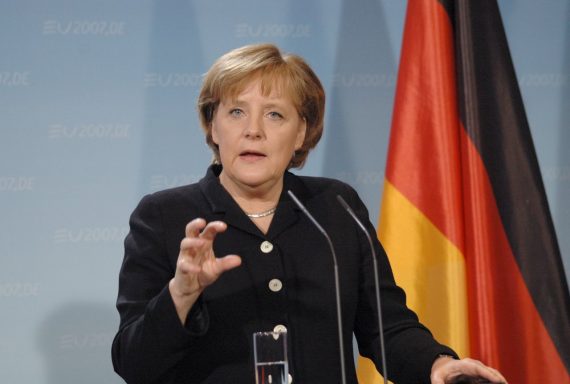

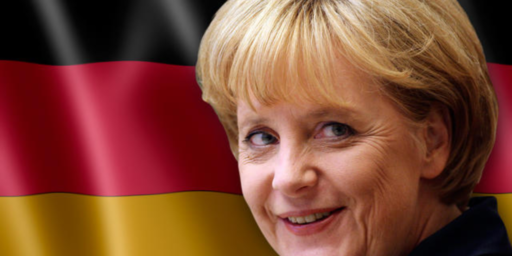
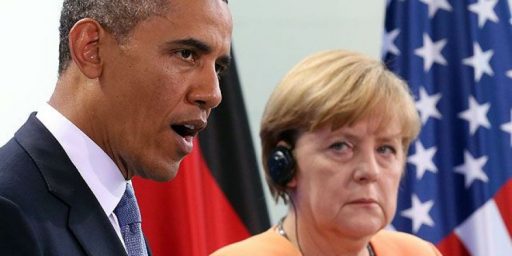
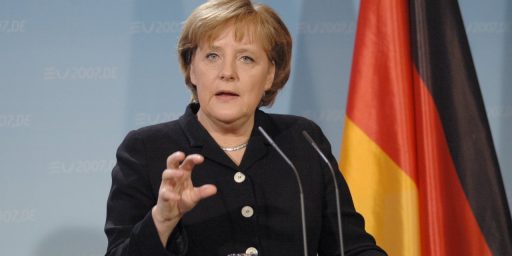
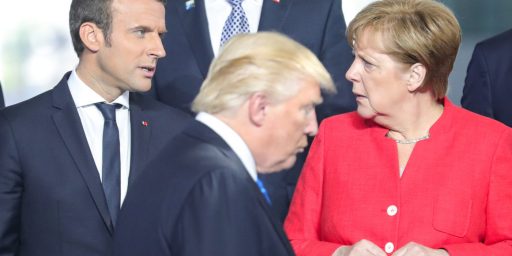
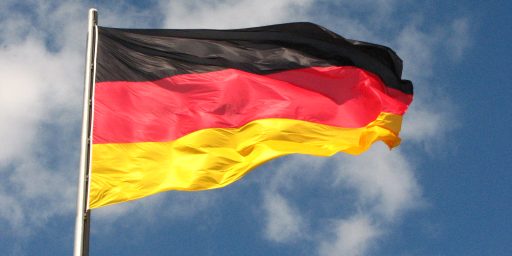
Political change coming to Germany? Or more of the same.
Political change to the US. We elected a president who is a racist sexual predator who has been using the presidency as a money-making opportunity even before he takes office. Maybe Ivanka can set up a home shopping channel right of the White House, although she already got a good start hawking her jewelry on the 60 Minutes interview. By the way, did she rip off that design like she copied her line of shoes? A real chip off the old block.
People should never forget that the US elected an admitted sexual predator as their next president. Almost two weeks later, and I’m still stunned that any woman could have voted for him, especially older women who were likely to experience the “Trump treatment®” at work.
It’s likely that the new parliament will end up similar like the last Berlin election, with no possible two party coalition having a majority (as there are likely to be 6 parties total in the parliament). The issue in Germany is the AfD, a populist party that’s gaining from both the right and the left. If they get the predicted 20%, and have enough votes with CDU and FDP to block red:red:green from taking over, will the CDU hold on to their pledge of not going into a coalition with them? The SPD’s “never with the ex-SED” lasted exactly as long until they could grab power.
Quick, what is ‘Nasty woman’ in German? I need to set up a t-shirt concession.
Angela Merkel is a good person who got carried away with her own goodness and took her eye off the ball. Her refugee decision has been disastrous for Europe and now for the United States. Among the results are that there is now zero chance of a Syrian refugee gaining sanctuary here. And Assad will have free rein, backed by a sanctions-free Russia. The EU may continue to come apart. And if I were Estonian I’d be checking my passport. A good-hearted decision that has had really terrible effects.
It’s not enough to feel good about what we’re doing. We need to look downstream at the effect. And when we have to choose between emotions and reason we have to choose the path least likely to cause harm and do the greatest good for the greatest number. We are each just one person, and the feelings of the one are not to be lightly weighed against the lives of real people.
I would not bet any money on her that I could not afford to lose.
@michael reynolds:
Syrian refugees are non-White and they are Muslim. They would not get sanctuary, regardless of Merkel.
@Andre Kenji de Sousa:
You know, Arabs were considered white at some point, before Islamic terrorism caused them to be cast out from the tribe. As part of the Semetic group, they are no less white than Jews. Even purely from skin tone, many Syrians are more “white” than Greeks and Italians.
@Andre Kenji de Sousa:
I thought there were a fair number of Christian Syrians? Not to mention some may be Yazidi.
No matter now, that door to the U.S. got slammed shut. (Canada will step up hopefully)
And yes, I do blame Merkel in part for contributing to this whole Trumpian debacle. Not the whole mess obviously, maybe only a percent or two (but how much did Hillary lose Florida by again?)
She is part of the reason the “regular people” consider the elites reckless and uncaring of their concerns. It helps that Merkel is in fact reckless and uncaring.
The argument that this policy was in Germany and not the good ole USA while true misses the point that more and more news is Global. It reinforces the message that an outsider is needed since the insiders, the status quo is at best a train wreck and at worst actively pursuing policies detrimental to the welfare of the people.
Most Trump fans don’t even know Merkel. They probably would say “oh yeah, Urkel, that nerdy kid on Family Matters…”
I wish her luck.
The German people do not want more of the same. They have the immigrant crisis and the economic turmoil. Merkel totally misjudged the problems that the immigrant policy brought on: violence, assaults on women, and uncontrolled activity. Now Merkel has been running around telling Greece not to let any more of these people in, as are other leaders. Merkel has been trying to get a lot of the immigrants out. There should have been a thorough background check of each person. Those with a good education, such as scientists, doctors, engineers, economists, and other professionals should have been considered. Also they should be healthy. The lesson for everyone is that any country should protect their sovereignty and not let themselves be overran by hordes of outsiders; some of who may be fine, but some obviously aren’t.
Germany was never going to allow a humanitarian crisis of unprecedented scale involving refugees in Europe. I hope I don’t have to explain why.
@MikeSJ:
They are basically indistinguishable, socially and economically speaking, from Muslim Syrians. There are many Christians that are married to Muslims.
@Andre Kenji de Sousa:
Merkel’s reckless move on Syrian refugees led directly to Obama’s (supported by Hillary) equally reckless move. It was the wrong message at the wrong time. While soon-to-be-Trump voters were feeling sorry for themselves and neglected and ignored, suddenly the government they feel is ignoring them prioritizes opening the doors to 10,000 people from Syria.
It was a very foolish political mistake, from Merkel to Obama. The people who will suffer most directly are the very people we were trying to help. Merkel/Obama accomplished the exact opposite of what they were hoping for. Outcomes where good motives yield bad results are not helpful.
I have no opinion on who Germans should vote for, but Ms. Merkel’s last couple of years have been an absolute disaster for the West.
I don’t follow German politics closely so I could be very well missing something, but this sounds like a bad idea.
It could provide an opportunity for the AfD (Alternative for Germany), which is anti-immigrant and anti-Euro. This party is relatively new, and has already managed to gain seats in some state elections.
She isn’t popular, so it would seem wise for her to step down and let some other Christian Democrat run in her place. (Who would be suitable to replace her, I don’t know.) Some sort of coalition government is inevitable, but you really shouldn’t want the AfD to play an important part in it.
Judging from the press. AfD is moving quickly from being a high-brow Eurosceptic’s club into the sort of right-wing populist party that we should be worried about, complete with Nazi-era sloganeering, Islamophobia, and calls for the cops to shoot at immigrants.
Ironically, Merkel’s Christian Democrats were founded as a center-right, anti-fascist party after WWII, to provide conservative voters with a reasonable alternative to the hard right. So Merkel ought to know that the country’s and party’s legacies are riding on her.
@Pch101: AfD’s support is regional and largely in the former East Germany, especially Sachsen (Germany’s West Virginia). They have won seats in those state parliaments but not much in the former West.
If the Bundesrat stays generally within its current configuration there probably won’t be anyone who wants to form a coalition that includes AfD. Certainly the SPD, Linke (The Left), and Gruene (Greens) will want nothing to do with them. I doubt even the CDU/CSU will want to associate with AfD.
As far as a potential successor to Merkel, I don’t know, maybe von der Leyen (current defense minister) or de Maziere (interior minister), both CDU and loyal to Merkel. Schaeuble might have been a contender a few years ago but he’s over 70 now and probably won’t want to deal with the pressures at that age.
@Mikey: The AfD has managed to get past the 5% minimum in every election they have competed in. The state parliaments they are not represented in haven’t had elections since they started in 2014.
Germany is now the repository of liberal values and the leader of the free world. Let that sink in.
Angela Merkel will probably win a fourth term for the reason FDR won HIS fourth term-Europe needs a steady hand on the tiller in these troubled times, and Merkel is that.
Given the likelihood that Trump is going to look the other way if Russia pushes west, we might see Germany rebuild its armed forcesand take a much bigger role in NATO. Either way, we are looking at interesting times and I for one would feel better if Merkel stayed on.
@Mu: Not quite–they only got 4.1% in Hessen.
They got 20% in Mecklenburg-Vorpommern and almost 25% in Sachsen-Anhalt, which are in the former East.
I saw a report today on DW that said 28% of Germans support right-populist policies, but it didn’t break out by the individual Bundeslaender.
@Tyrell: Meanwhile the actual crime statistics don’t back up your bullshit assertions in regards to the immigrants in Germany. The German government itself has found that the average immigrant is much less likely to commit a crime than a native German. I’ve seen some serious grade A bullshit being peddled as facts about that area by people in the USA. My favorite would have to be when Fox news and some other news media sources were peddling bullshit about Muslims establishing “no go” areas in Europe where police, non Muslims and such weren’t allowed to go…….
http://www.dw.com/en/report-refugee-related-crimes-in-germany-increase-less-than-influx-of-asylum-seekers/a-19053227